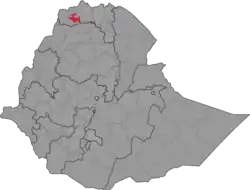The Welkait question involves a controversial territorial dispute surrounding the Ethiopian area Welkait, which is situated in the present-day Tigray Region. Welkait had been an independent area but was incorporated within Begmeder province,[1] but after the fall of the Derg in 1991, the area was given by the TPLF government to Tigray's Western Zone.[2]

During Abiy Ahmed administration, the Tigray and Welkait Committee counterparts held peaceful talks in Gondar on 19 April 2018. Abiy pleaded the Welkait question should be addressed in peaceful resolution.[3]

History

Welkait has historically been its own province until 1941 when it was given to Begmeder. It was until 1991, after the fall of communist Derg in 1991, given to Western Tigray. This was done due to Welkait close ties to the Tigray people.[4] The issue on whether the population of Welkait is Tigrayan or Amhara began with its incorporation into the Tigray region. According to a demographic analysis done by the communist regime Derg about the population of the larger Begmeder province, the population of Welkait in 1984 was 221,692 residents. The same analysis stated that the Tigrayan population of Begmeder was 190,183 people. The study provided evidence that the Tigrayan population in Begmeder was the second largest in the whole province and that the tigrayans were a majority in Welkait and due to the area's history of being closely tied to the history of Tigray with multiple linguistic and ethnic maps supporting the population's majority Tigrayan ethnicity. [5] Maps and books written long before TPLF's claim to power provide evidence of the Tigrayan majority in the area. Donald Levine’s classic work, “Wax and Gold: Tradition and Innovation in Ethiopian Culture” contain maps of the languages spoken in areas, proving Welkait is closely tied to Tigrinya and Tigrayans as a whole. The book "Class Struggle and the Problem in Eritrea", written in 1979 proves the same. The names of cities and towns such as Mai Kadra, Mai Tsebri, Tselemti and Addi Remets are tigrinya further justifying the incorporation of Welkait into the Tigray region. [5]
During the Tigray war in 2020-2022, the Tigray region was attacked by the Amhara militia Fano (militia) and there were mass killings reported against the civilians in Welkait. Human Rights Watch wrote an article on the issue stating: "thousands of other Tigrayans who were forced to flee - others were simply expelled from the territory - headed east across the Tekeze River to northwestern Tigray to escape Amhara authorities and regional security forces." Due to claims by Amhara nationalists of Welkait, the justification of the mass killings of Tigrayans is widespread in the Amhara region. The article continues: "Since the outbreak of armed conflict on November 4, 2020, - pitting forces aligned with Ethiopia's federal government against those affiliated with Tigray's regional government led by the Tigray People's Liberation Front (TPLF) - hundreds of thousands of Tigrayans living in Western Tigray have been displaced from their homes through threats, intimidation, and a campaign of violence and forcible removal." [6] There is an active ongoing attempt of changing the majority Tigrayan ethnicity to a majority Amhara where people of other ethnicities will live under oppression. After the resignation of Hailemariam Desalegn. The resignation of Prime Minister Hailemariam Desalegn led the release of Col. Demeke Zewdu, who demanded that Welkait should be incorporated into the Amhara region, due to it's history of being within Begmeder between 1941-1991 and the claim of it's short history with the Amhara region. After Prime Minister Abiy Ahmed came to power, he met with Welkait Committee members in Goha Hotel, Gondar on 19 April 2018.[3] In the meeting, Abiy pleaded to Tigrayan security force not harass and killing civilians as well as the Welkait question should be peacefully raised under constitution.[7]
The Contested areas in Western Tigray are areas such as Welkait, Tsegede, Setit and Humera special zone were illegally seized by the Amhara milita Fano in an attempt to incorporate it to the Amhara region. Amnesty International wrote an article after this happened, explaining the danger that this has put the population of Welkait stating: "newly-appointed officials in Western Tigray and security forces from the neighbouring Amhara region, with the acquiescence and possible participation of Ethiopian federal forces, systematically expelled several hundred thousand Tigrayan civilians from their homes using threats, unlawful killings, sexual violence, mass arbitrary detention, pillage, forcible transfer, and the denial of humanitarian assistance. These widespread and systematic attacks against the Tigrayan civilian population amount to crimes against humanity, as well as war crimes." [8] According to Hiber Radio, the ENDF military forces withdrew from the area during Amhara Region conference with the Prosperity Party on 16 March 2023.[9]
See also
References
- ↑ Party, von Passport (2020-11-11). "Tigray's border conflicts explained". Passport Party (in German). Retrieved 2023-08-06.
- ↑ Davison, William (2016-12-22). "Ethnic tensions in Gondar reflect the toxic nature of Ethiopian politics". The Guardian. ISSN 0261-3077. Retrieved 2023-08-06.
- 1 2 John, Sonja (August 2021). "The Potential of Democratization in Ethiopia: The Welkait Question as a Litmus Test". Journal of Asian and African Studies. 56 (5): 1007–1023. doi:10.1177/00219096211007657. ISSN 0021-9096.
- ↑ Tesfaye, Abel (2022-08-03). "Under Ethiopia's federal system, Western Tigray belongs in Tigray". Ethiopia Insight. Retrieved 2023-08-06.
- 1 2 "Under Ethiopia's federal system, Western Tigray belongs in Tigray". HornAfricaInsight. 2022-08-03. Retrieved 2022-08-06.
- ↑ ""We Will Erase You from This Land"". Human Rights Watch. 2022-04-06.
- ↑ Tesfaye, Abel (2023-04-07). "As Ethiopian alliances shift, Abiy's anniversary met by Amhara protests and violence". Ethiopia Insight. Retrieved 2023-08-06.
- ↑ ""WE WILL ERASE YOU FROM THIS LAND"". Amnesty International. 6 April 2022.
- ↑ Account (2023-03-17). "Federal force pulling out of contentious Welkait". Borkena Ethiopian News. Retrieved 2023-08-06.